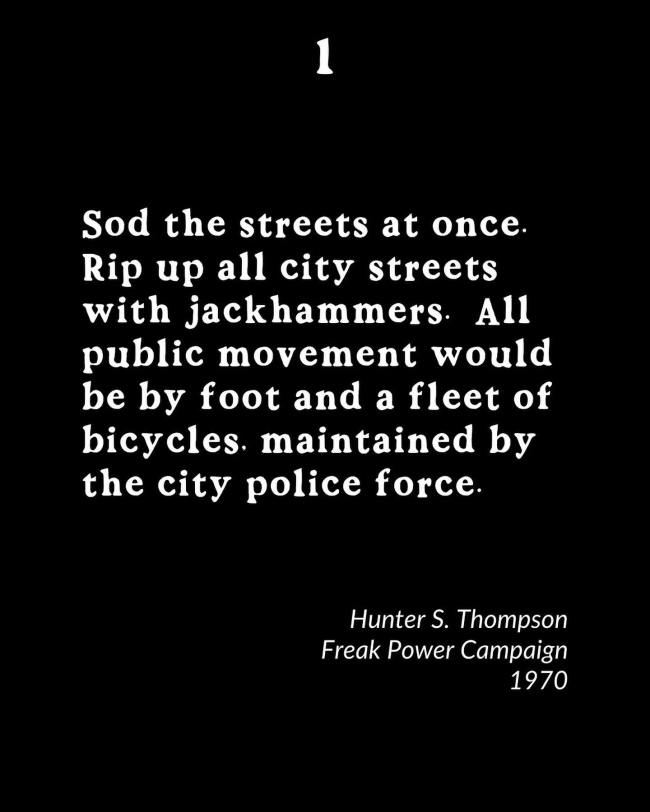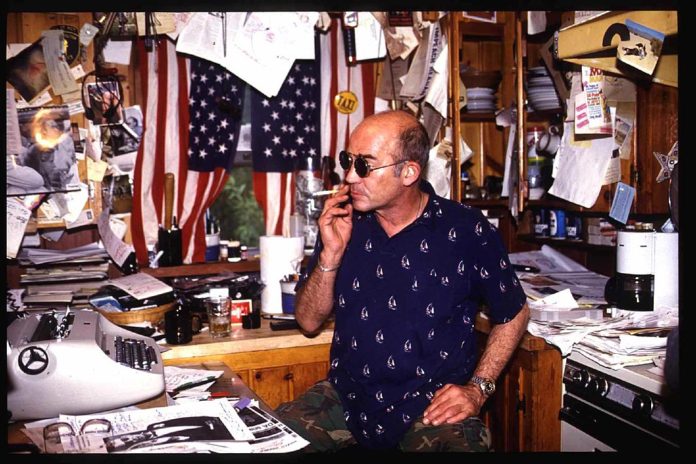“Politics is the art of controlling your environment.” – Hunter S. Thompson
Aspen, Colorado is one of the most interesting small towns in America. While the mountain setting near Maroon Bells is nothing short of breathtaking, it can be a grotesque place if you’re not into the whole opulence and greed thing.
A cowboy mining town-turned-tony ski resort, displays of wealth in Aspen are ostentatious and obscene for a town with less than 8,000 permanent residents. There are only two small grocery stores, yet art galleries and luxury retail shops like Prada, Gucci, Ralph, and Kith liter the downtown, just a stones throw from the Silver Queen Gondola up Aspen Mountain.
Billionaires, tycoons, and oligarchs fly in on private jets to rub elbows in the Rocky Mountains, causing a never-ending real estate feeding frenzy where the 1% of the world’s 1% tries to outbuild each other with multi-million dollar ranches and lodges. According to Zillow, the median home price in Aspen is a staggering $1,981,224 – a price that would barely get you a three bedroom ski condo. Celebrities like Kevin Costner, John Oates, Kurt Russel, the Kardashians, and Jack Nicholson are semi-permanent fixtures around town.
Not exactly your prototypical small town American life.
Underneath the shiny veneer of wealth and elitism, Aspen is home to an infantry of hard-working commoners, ski bums, and rugged Colorado individualists that keep the Roaring Fork Valley’s tourist-driven economy running. The kind of people who pride themselves out of necessity for keeping society running in return for a paycheck – Property managers, ranchers, chefs, bartenders, dispensary managers, fly fishing guides, ski instructors, landscapers, journalists, sanitation workers, golf course superintendents.
This paradigm has existed for generations now, going back to the 1950s when America’s titans of industry and their heirs starting flocking to the town for a quiet retreat at 8,000 feet above sea level.
In October 1970, famed gonzo journalist Hunter S. Thompson published a Rolling Stone feature called The Battle of Aspen, detailing the battle between the town’s haves vs. have nots, bubbling to the forefront in the town’s 1970 Mayor election. See, Aspen thrived as an outpost of the counterculture in the ’60s, when the of San Francisco scene and its hippy ideals started finding new footholds across America. Thompson, after finding commercial literary success with Hells Angels, moved from California to Woody Creek, just down the river from Aspen, where he lived on a ranch called Owl Farm.
Inspired by a groundswell of political activism in the 60s, Thompson used that article in Rolling Stone to establish what he called “the Freak Power platform.” Thompson used this article to put a national spotlight on his campaign for Sheriff of Pitkin County, Colorado the following year:
“Why not challenge the establishment with a candidate they’ve never heard of? Who has never been primed or prepped or greased for public office? And whose lifestyle is already so weird that the idea of ‘conversion’ would never occur to him? In other words, why not run an honest freak and turn him loose, on their turf, to show up all the normal candidates for the worthless losers they are and always have been?”
Thompson’s greater point to a new generation of young voters (…now, The Boomers): Politics has the most punch at the local level first, national second. In his own words, politics is “the art of controlling your environment.”.
Thompson’s bid for Sheriff in rural Pitkin County received national media attention, largely for Thompson’s passion zeal for his Freak Power platform and antics. He established a headquarters at the Hotel Jerome smack in the center of Aspen. He shaved his head and pledged to rename Aspen “Fat City,” ripping up the city’s streets, banning overzealous developers, and legalizing marijuana – considered a radical platform in Nixon’s America at the time.

Ultimately, Thompson lost the election, 173 to 204 votes. He never ran for public office again, but leveraged the experience to steer headfirst into the wider American political theater. As a result, Thompson set out to famously cover George McGovern’s campaign against Richard Nixon in the 1972 election for Rolling Stone, as chronicled in Fear And Loathing On The Campaign Trail 1972.
Depending on who you ask, the idea of Freak Power stuck. The Freak Flag was firmly planted in the eyes of a new generation and the Freak Power ideals continue to fly, especially in the landscape of the present day – an idealogical fight that values freedom of the individual against a ruling class via systematic autocracy. The battle against having an establishment just for the establishment’s sake.
—
Thompson’s unconventional bid for sheriff is now the subject of a brand new documentary, Freak Power: The Ballot Or The Bomb, slated to be release On Demand on October 24th. It will also be available via Amazon and Apple.
If nothing else, it’s proof that American politics have always been a chaotic circus, down to its molecular core.
Hunter S. Thompson went to the 1968 Democratic Convention in Chicago as a journalist and returned home disgusted, yet motivated by what he’d just seen: violently suppressed protests, riots, corrupt politicians, and abusive cops. Back in Aspen, he finds more of the same. The local police and sheriff’s departments are targeting young people, harassing and charging them with absurd crimes and trying to push them out of town. Hunter decides he has to do something to change the police brutality that has become the norm.
We follow Hunter as he builds his own political movement, which grows from a local sheriff’s race to a national media sensation. He creates a radical platform in which he envisions completely reforming the sheriff’s office by disarming the police, focusing on environmental crimes and legalizing marijuana.
As Hunter and his friends grapple with the challenges of trying to transform the political landscape in Aspen, they become ensnared in the corruption and cronyism of the political establishment. During an era when the police and FBI were hunting down activists and jailing or assassinating them, Hunter’s campaign puts him in the crosshairs of J. Edgar Hoover and the forces that are under the thumb of Nixon. Soon there are death threats, bombings, an agent provocateur and Aspen becomes an ideological battleground for what “The American Dream” really means and how powerful interests often coalesce to undermine democracy.
2020 might be one long, bad acid trip, but it’s somewhat comforting to know that bad acid trips in American politics aren’t really anything new.
The reality is that it’s the norm – American politics have always been stark raving mad.
Here’s the trailer for the film:
Credit: Source link






























